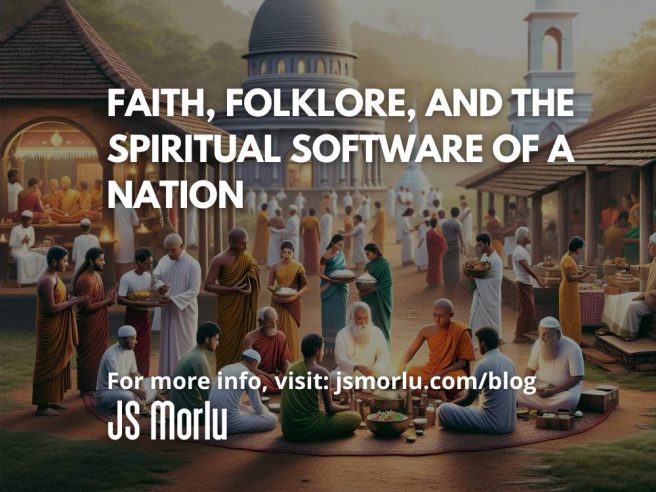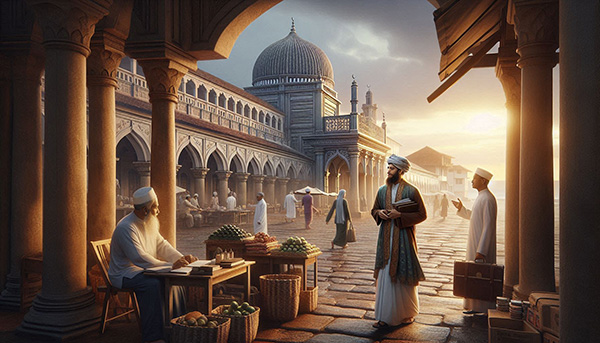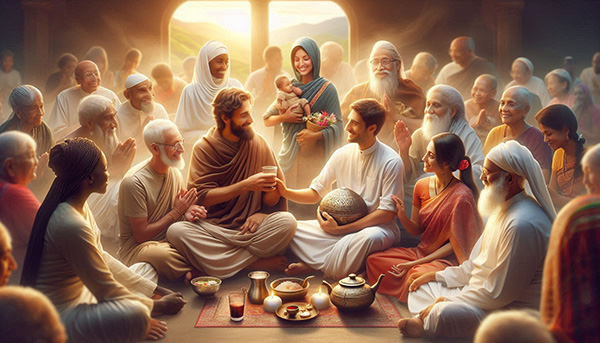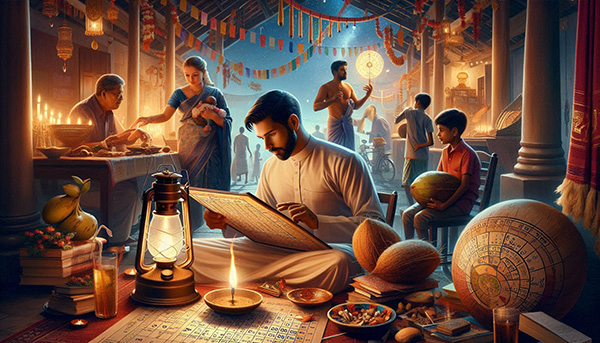By: John S. Morlu II, CPA
You can’t understand Sri Lanka with just a map. Or a bank statement. Or a cup of tea.
To really understand it — you have to feel it. In your bones. In the silence of a temple courtyard. In the sound of conch shells at sunrise. In the incense-soaked air of a shrine that’s older than your ancestors.
Because Sri Lanka runs on something more than GDP or geopolitics.
It runs on belief.
Welcome to the spiritual software of the island — where faith isn’t a side dish, it’s the operating system.
Where Religion Is Not Just Practiced — It’s Lived
In Sri Lanka, religion isn’t confined to a Sunday morning or Friday prayer. It bleeds into every part of life — from governance to greetings, festivals to funerals, the way people bless their homes to how they start their businesses.
Buddhism (Theravāda) — ~70%
The majority religion. Quiet. Deep. Omnipresent.
Buddhism here is not just spiritual — it’s civic. Temples aren’t just places of worship; they’re community hubs, historical archives, orphanages, schools, political influencers, and sometimes — power brokers.
Every full moon (Poya Day) is a national holiday. No alcohol. No meat sold. The nation literally slows down to reflect.
The Bodhi tree in Anuradhapura, believed to be a sapling from the original tree under which Buddha attained enlightenment, is protected more seriously than most politicians.
Monks sit in Parliament. Some lead protests. Others prefer to guide in silence. But make no mistake: they’re revered, feared, and respected.
Hinduism — ~12.6%
Mainly practiced by the Tamil community. Colorful. Intense. Personal.
The Nallur Kandaswamy Temple in Jaffna hosts an annual festival where devotees pierce their bodies in devotion. It’s not for tourists — it’s raw, real, and deeply moving.
Offerings are made with flowers, fire, and absolute devotion. The deities are many. The faith is unwavering. Statues are not just art — they are living beings to be bathed, fed, and adorned.
Hinduism here is about duty, ritual, and relationship — with gods, ancestors, and nature.
Islam — ~9.7%
Mostly Sunni. Rooted in centuries of trade. Quietly resilient.
Mosques are sprinkled across the island — from Galle Fort to Batticaloa — a reminder that Muslims were some of the island’s earliest traders, arriving as early as the 8th century.
They brought not just goods — but architecture, food, and a certain calm strength. Today, Muslims in Sri Lanka are often merchants, doctors, and scholars. They face challenges, yes — but also hold a tight-knit identity that binds them beyond sect or city.
Christianity — ~7.4%
Brought by the Portuguese, deepened by the Dutch, spread by the British.
You’ll find Catholic churches with pastel saints, Protestant schools with British-style uniforms, and Christmas celebrations that feel more like street festivals than solemn ceremonies.
Christianity here is uniquely Sri Lankan — where St. Anthony and the Buddha share the same calendar and families host both a nativity and a Vesak lantern.
Spiritual Syncretism: Where Everyone Shares Everything
One of the most beautiful things about Sri Lanka?
No one owns spirituality.
- You’ll see Christians at Buddhist temples.
- Hindus lighting oil lamps during Ramadan.
- Muslims attending Christmas dinners.
- Buddhists tying blessed threads on Hindu devotees.
It’s not confusion. It’s coexistence.
A deeply local blend of respect and practicality — “If it brings peace, I’m in.”
Even politicians know better than to disrespect this blend. Faith in Sri Lanka might be personal — but it’s also political.
Folklore, Spirits & Sacred Animals
Sri Lanka’s spiritual world isn’t limited to organized religion. It’s rich with myths, folk beliefs, and cosmic cautionary tales.
- The demon king Ravana (yes, from the Ramayana) is said to have ruled here. Some believe he was misunderstood — a genius, not a villain. He even had his own flying machine, the Pushpaka Vimana.
- Naaga deities (serpent spirits) protect sacred lakes and trees. Angering them? Not advised.
- Preta ghosts — wandering spirits of the unsatisfied dead — can bring misfortune. The solution? Rice balls, incense, and a good conversation with a monk.
- White elephants, crows, and geckos are considered omens — good or bad, depending on the hour, direction, and your grandmother’s mood.
Sri Lanka is a place where science and spirituality coexist — not as opposites, but as co-conspirators in survival.
Astrology & Rituals: The Island’s Hidden Operating System
Before weddings, elections, or even haircut appointments — Sri Lankans consult astrologers. The date, time, direction, and even footwear could depend on planetary alignments.
Every birth chart (horoscope) is read like a corporate strategy plan.
Every ritual — from anointing oil on New Year’s Day to breaking coconuts during new business launches — is done with precision and purpose.
Call it superstition. Sri Lankans call it due diligence.
Why You’ll Feel It Before You Understand It
In Sri Lanka, faith isn’t forced on you.
But it wraps around you like humidity — soft, omnipresent, and undeniable.
You’ll find peace in the rhythm of the rituals.
You’ll be humbled by the silence of the shrines.
You’ll feel protected, even if you don’t know by what.
And when you leave, you’ll find yourself bowing slightly without knowing why.
You’ll miss the bells. The prayers. The pause.
Because even if you came here as a tourist,
Sri Lanka quietly, gently, almost accidentally — makes you believe.
Next Up: My Sri Lanka – Part 6
“Diaspora Diaries: Leaving the Island, Longing for Home”
About the Author
John is an entrepreneur, strategist, and founder of JS Morlu, LLC, a Virginia based CPA firm with multiple software ventures including www.FinovatePro.com, www.Recksoft.com and www.Fixaars.com . With operations spanning multiple countries, John is on a mission to build global infrastructure that empowers small businesses, entrepreneurs, and professionals to thrive in an increasingly competitive world. He believes in hard truths, smart execution, and the relentless pursuit of excellence. When he’s not writing or building, he’s challenging someone to a productivity contest—or inventing software that automates it.
JS Morlu LLC is a top-tier accounting firm based in Woodbridge, Virginia, with a team of highly experienced and qualified CPAs and business advisors. We are dedicated to providing comprehensive accounting, tax, and business advisory services to clients throughout the Washington, D.C. Metro Area and the surrounding regions. With over a decade of experience, we have cultivated a deep understanding of our clients’ needs and aspirations. We recognize that our clients seek more than just value-added accounting services; they seek a trusted partner who can guide them towards achieving their business goals and personal financial well-being.
Talk to us || What our clients says about us





